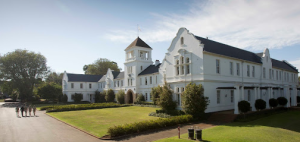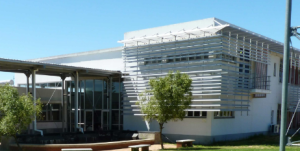The Essentials
Type of Institution: University
Fees per Semester: R15 000 – R60 000
Address: Private Bag X3, Rondebosch 7701, South Africa
Phone Number: +27 (0)21 650 9111
Chancellor: Dr Precious Moloi-Motsepe
Vice Chancellor: Mosa Moshabela
Number of students: 25 000+
Website: https://www.uct.ac.za/
Email: admissions@uct.ac.za
Table Of Contents
- Overview
- Contact Details
- Address
- Location
- School Fees
- Courses & Programs
- Vacancies and Entry Requirements
- Logo
- Notable Alumni
- Pros and Cons
- Author’s Review
Overview
The University of Cape Town (UCT) is South Africa’s oldest university and one of the leading higher education institutions on the African continent. Founded in 1829 as the South African College, UCT has evolved into a research-intensive university known for academic excellence, global rankings, and significant contributions to social change.
Global Recognition
UCT consistently ranks among the top universities globally, particularly excelling in fields such as environmental science, social sciences, and law.
Campuses
UCT’s main campus is located on the slopes of Table Mountain in Cape Town, offering stunning views and historic architecture. The university also operates several satellite campuses.
Faculties
UCT has six main faculties:
Commerce
Engineering & the Built Environment
Health Sciences
Humanities
Law
Science
Research Excellence
UCT is a hub for cutting-edge research in areas like health, technology, the environment, and social development. The university hosts several research centers and institutes of global standing.
Community Engagement
The university engages with the surrounding community through outreach programs, partnerships, and initiatives aimed at promoting social justice and environmental sustainability.
Admission & Programs
UCT offers a wide range of undergraduate and postgraduate programs, with competitive admission requirements. International students are welcomed, and the university provides a supportive environment through various student services.
University of Cape Town Contact Details
You can contact University of Cape Town via their landline, email or you can visit their website for further contact details.
Phone Number: +27 (0)21 650 9111
Website: https://www.uct.ac.za/
Email: admissions@uct.ac.za
University of Cape Town Address
Private Bag X3, Rondebosch 7701, South Africa
University of Cape Town Location
University of Cape Town is located in the city of Cape Town under the Western Cape province of South Africa in a suburb called Rondebosch.
University of Cape Town Fees
University of Cape Town’s fees is currently standing at R15 000 – R60 000 per semester depending on the program you are studying and the level of degree you are studying. Please contact the institution or visit them to get the latest fees structure as it can change at any term or semester.
University of Cape Town Courses & Programs
The University of Cape Town (UCT) offers a wide range of undergraduate, postgraduate, and diploma programs across various faculties.
Faculty of Commerce
Undergraduate:
Bachelor of Business Science (BBusSc) in various specializations: Economics, Finance, Marketing, Information Systems
Bachelor of Commerce (BCom): General Accounting, Economics and Finance, Information Systems
Postgraduate:
Honours in Finance, Economics, Accounting, Information Systems
Master of Business Administration (MBA)
Master of Commerce (MCom)
Doctor of Philosophy (PhD)
Faculty of Engineering & the Built Environment
Undergraduate:
Bachelor of Science in Engineering (BScEng): Civil Engineering, Mechanical Engineering, Electrical Engineering, Chemical Engineering, Mechatronics, Bachelor of Architectural Studies (BAS)
Postgraduate:
Master of Science in Engineering (MScEng)
Master of Architecture (MArch)
Master of Urban Design
PhD in various engineering disciplines
Faculty of Health Sciences
Undergraduate:
Bachelor of Medicine and Bachelor of Surgery (MBChB)
Bachelor of Science in Occupational Therapy
Bachelor of Science in Physiotherapy
Bachelor of Science in Nursing
Postgraduate:
Master of Medicine (MMed)
Master of Public Health (MPH)
Master of Science in Medicine (MScMed)
PhD in Health Sciences
Faculty of Humanities
Undergraduate:
Bachelor of Arts (BA): Languages and Literatures, Philosophy, Politics, and Economics, Media and Writing
Bachelor of Social Science (BSocSc)
Bachelor of Music (BMus)
Postgraduate:
Honours, Master’s, and PhD in: Anthropology, Political Studies, Sociology, History, Film and Media, Linguistics, Music
Faculty of Law
Undergraduate:
Bachelor of Laws (LLB)
Postgraduate:
Postgraduate Diploma in Law (PGDip)
Master of Laws (LLM)
Doctor of Philosophy (PhD) in Law
Faculty of Science
Undergraduate:
Bachelor of Science (BSc): Physics, Chemistry, Computer Science, Biological Sciences, Environmental and Geographical Science
Postgraduate:
Honours, Master’s, and PhD in: Mathematics
Computer Science, Astronomy, Marine Biology, Environmental Science
Graduate School of Business (GSB)
Postgraduate:
Master of Business Administration (MBA)
Executive MBA
Master of Commerce in Development Finance
Master of Philosophy (MPhil) in Inclusive Innovation
PhD in Business Administration
Centre for Higher Education Development
Academic Development Programs aimed at supporting students with transitioning into university life.
University of Cape Town Vacancies and Entry Requirements
The University of Cape Town (UCT) offers a variety of vacancies and opportunities for students, including undergraduate and postgraduate admissions.
Undergraduate Admissions Vacancies
Faculties and Available Programs
Vacancies are available across various faculties, including:
Commerce
Engineering & the Built Environment
Health Sciences
Humanities
Law
Science
These vacancies open for new intakes at the beginning of the academic year, with programs such as Business Science, Medicine (MBChB), Law, Engineering, and Sciences being some of the most sought-after.
Entry Requirements for Undergraduate Programs
National Senior Certificate (NSC):
Applicants must have a valid NSC with admission to Bachelor’s studies.
The minimum Achievement Level required in subjects such as Mathematics and English varies depending on the faculty.
For example, Commerce and Engineering often require a high pass in Mathematics (60-70%) and English (50-60%).
Points System (UCT Admission Points Score – APS):
UCT uses an APS based on six subjects in the NSC.
Students must meet the specific APS threshold for each faculty. Popular courses, such as Health Sciences, typically require a higher APS score.
Subjects Requirements:
Certain faculties have specific subject requirements. For example, Engineering requires Mathematics and Physical Sciences, while Health Sciences requires Life Sciences and Mathematics.
National Benchmark Tests (NBTs):
All applicants must write the NBTs, which assess academic literacy and quantitative literacy. These tests are used in conjunction with the NSC results to determine admission.
Postgraduate Admissions Vacancies
Faculties and Available Programs
Postgraduate vacancies are available for Honours, Master’s, and PhD programs across all faculties. The Graduate School of Business also offers vacancies for specialized business programs such as the MBA and MPhil.
Entry Requirements for Postgraduate Programs
Honours Programs:
A relevant Bachelor’s degree with a strong academic record (typically a minimum of 65% in the major subjects).
Master’s Programs:
*An Honours degree or a four-year Bachelor’s degree in a related field is required.
*Depending on the program, additional work experience may be needed (e.g., for the MBA program).
Doctoral Programs (PhD):
*A Master’s degree in a relevant discipline with strong academic performance.
*A research proposal may be required for admission, depending on the field of study.
English Proficiency:
For international applicants whose first language is not English, proof of English language proficiency (such as IELTS or TOEFL scores) is necessary.
General Admission Guidelines
Application Process: All applications must be submitted online via the UCT admissions portal. The closing dates for applications vary depending on the program.
Application Fees: An application fee is payable for both local and international applicants.
Documentation:
*Applicants must submit certified copies of their academic transcripts, certificates, and NBT results (for undergraduates).
*Postgraduate applicants must also submit academic transcripts, a CV, a motivation letter, and, in some cases, a research proposal.
Special Admission Considerations
International Students: UCT welcomes international students and provides admission based on equivalent qualifications. International students are also required to provide proof of proficiency in English.
Redress and Diversity: UCT uses a policy of redress and diversity, which means applicants from disadvantaged backgrounds are given additional consideration in the admissions process.
Financial Aid and Scholarships UCT provides several scholarships, bursaries, and financial aid options for both local and international students, based on merit or financial need.
For the most accurate and up-to-date information on specific vacancies and entry requirements, it is advisable to visit UCT’s official website or contact their admissions office directly.
University of Cape Town Logo
Below is the logo of University of Cape Town with excellent quality and it is available to download in PNG (transparent file) JPEG and PDF.
University of Cape Town Logo
University of Cape Town Notable Alumni
Jodi Balfour – actress
Katlego Danke – actress
Nadia Davids – playwright, novelist, and author of short stories, and screenplays
Vincent Ebrahim – known for his role on The Kumars
Richard E. Grant – actor
Kagiso Lediga – stand-up comedian, actor and director
Zolani Mahola – lead singer of the South African band Freshlyground
Zandile Msutwana – actress
Koleka Putuma – poet and theatre-maker
Raymond Ackerman – businessman, who purchased the Pick ‘n Pay supermarket group from its founder; philanthropist
Roelof Botha – grandson of Pik Botha; began his career as an actuary and became a venture capitalist
Polly Courtice – founder Director of the Cambridge Institute for Sustainability Leadership and member of the Supervisory Board of Mercedes Benz Group
Chelsy Davy – ex-girlfriend of Britain’s Prince Harry
Sir Bradley Fried – ex-chief executive of Investec Bank; current chairman of Goldman Sachs International
Geordin Hill-Lewis – Mayor of Cape Town (2021– )
Nick Mallett – played for and later coached the Springboks, South Africa’s national rugby union team
Tshediso Matona – CEO of Eskom
Mark Nielsen – CEO of Talent
Mark Shuttleworth – billionaire entrepreneur; founder of Canonical Ltd; sponsor of the Ubuntu Linux distribution; second space tourist
Kimeshan Naidoo – entreprenuer and engineer, founder of Unibuddy.
University of Cape Town Pros and Cons
Pros
Diverse Academic Programs: UCT offers a wide range of undergraduate and postgraduate programs in various fields, including humanities, sciences, business, and law.
Strong Focus on Social Justice: The university has a reputation for its commitment to social justice and community engagement, encouraging students to be socially responsible.
Research Opportunities: UCT is recognized for its research initiatives, particularly in areas related to social sciences, health, and environmental studies.
Inclusive Environment: The university promotes diversity and inclusivity, fostering a supportive environment for students from various backgrounds.
Affordable Tuition: Compared to many other South African universities, UCT generally offers lower tuition fees, making it accessible for a broader range of students.
Strategic Location: Situated in Cape Town, UCT provides students access to a vibrant city known for its cultural diversity, natural beauty, and numerous internship opportunities.
Student Support Services: The university offers a range of support services, including academic advising, counseling, and career services, helping students navigate their academic journey.
Active Student Life: UCT has a vibrant student life, with various clubs, societies, and cultural events that encourage student involvement and community building.
Cons
Limited Resources: Some students may feel that the university lacks certain resources and facilities compared to larger, more affluent institutions.
Infrastructure Issues: While many areas are modern, some facilities may require upgrading or maintenance.
Large Class Sizes: In certain programs, class sizes can be large, which may limit individual interaction with lecturers.
Academic Pressure: The academic workload can be intense, which might be challenging for some students, particularly in competitive programs.
Transportation Challenges: Public transport options may be limited, making commuting to and from the university a challenge for some students.
Bureaucratic Delays: Some students have reported experiencing administrative inefficiencies, which can be frustrating when dealing with registration and financial aid.
Limited International Recognition: While UCT is respected locally, it may not have the same level of international recognition as some other South African universities.
Author's Review
University of Cape Town emerges as a compelling choice for students seeking a transformative educational experience rooted in social justice and community engagement. With its diverse academic programs, commitment to inclusivity, and supportive environment, UCT fosters both personal and academic growth.
While challenges such as limited resources and infrastructure issues exist, the university’s strengths often outweigh these drawbacks, particularly for those passionate about making a difference in society.
Situated in the vibrant city of Cape Town, UCT provides students with access to a rich cultural landscape and numerous opportunities for personal and professional development. Ultimately, UCT is well-suited for individuals looking to pursue meaningful education while contributing to the broader community.


